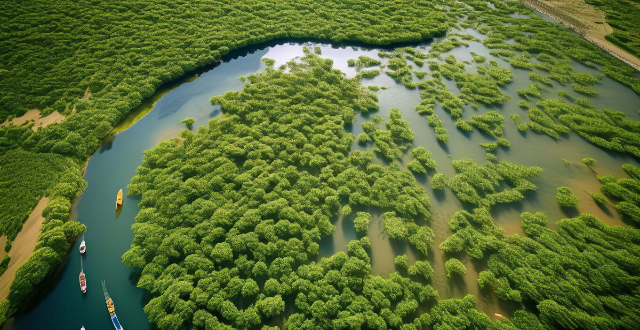Biodiversity plays a vital role in ecosystem services, including provisioning (like food and water), regulating (climate and flood control), cultural (recreational and spiritual enrichment), and supporting services (soil formation and nutrient cycling). Diverse plant species ensure resilience against pests and diseases, reducing the need for chemical interventions. Wetlands with varied vegetation types can more effectively filter pollutants from water than those with limited plant diversity. Different plant species play roles in carbon sequestration through photosynthesis, leading to more efficient carbon uptake and storage. Biodiversity can help regulate diseases by reducing the likelihood of pathogen spread. Diverse environments like coral reefs or tropical rainforests offer richer experiences for activities such as diving, hiking, and birdwatching. A variety of organisms, including bacteria, fungi, and earthworms, contribute to soil formation and maintenance, which is essential for plant growth. Different species have specialized roles in the cycling of nutrients. High biodiversity means functions can be performed by multiple species, providing a safety net if one species fails. Conservation efforts aimed at protecting and restoring biodiversity are vital for the sustained health of our planet's ecosystems.

The Impact of Biodiversity on Ecosystem Services
Biodiversity, the variety of life on Earth, plays a crucial role in maintaining and enhancing ecosystem services. These services include provisioning (such as food and water), regulating (like climate and flood control), cultural (recreational and spiritual enrichment), and supporting services (soil formation and nutrient cycling). Let's delve into how biodiversity influences these aspects:
Provisioning Services
- Food Production: A diverse array of plant species ensures resilience against pests and diseases, reducing the need for chemical interventions. For example, polyculture farming systems often yield higher produce than monocultures.
- Water Purification: Wetlands with varied vegetation types can more effectively filter pollutants from water than those with limited plant diversity.
Regulating Services
- Climate Control: Different plant species play roles in carbon sequestration through photosynthesis. Greater diversity can lead to more efficient carbon uptake and storage.
- Disease Regulation: Biodiversity can help regulate diseases by reducing the likelihood of pathogen spread. For instance, diverse forests are less prone to insect outbreaks than monocultures.
Cultural Services
- Recreational Values: Biodiverse environments like coral reefs or tropical rainforests offer richer experiences for activities such as diving, hiking, and birdwatching.
- Aesthetic and Spiritual Benefits: Diverse landscapes provide aesthetic beauty and spiritual inspiration that are highly valued by many cultures around the world.
Supporting Services
- Soil Formation: A variety of organisms, including bacteria, fungi, and earthworms, contribute to soil formation and maintenance, which is essential for plant growth.
- Nutrient Cycling: Different species have specialized roles in the cycling of nutrients. For example, leguminous plants fix nitrogen from the air, benefiting other plants in the ecosystem.
Key Points to Consider
- Interdependence: Species within an ecosystem often depend on each other for survival, forming complex relationships that maintain balance.
- Redundancy: High biodiversity means functions can be performed by multiple species, providing a safety net if one species fails.
- Evolutionary Potential: Diverse ecosystems allow for natural selection and adaptation, fostering resilience against environmental changes.
In conclusion, biodiversity is not just an assortment of various species; it is the backbone of ecosystem functioning that directly affects the services we rely upon for our well-being and survival. Conservation efforts aimed at protecting and restoring biodiversity are therefore vital for the sustained health of our planet's ecosystems.